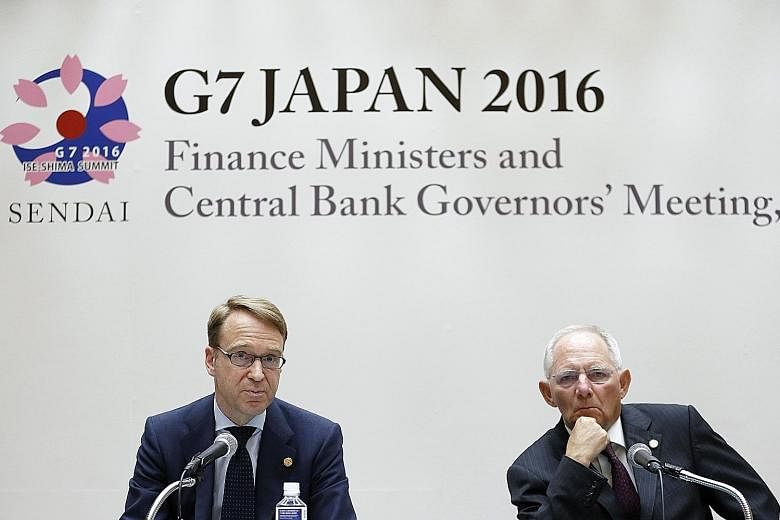SENDAI (Japan) • Finance chiefs from the world's biggest developed economies meeting in Japan underscored concerns that global growth is flagging and reaffirmed a pledge not to deliberately weaken their currencies, even as Japan again warned about the yen's surge.
At the end of two days of talks, Group of Seven (G-7) central bank governors and finance ministers highlighted risks from terrorism, refugee flows, political conflicts and the potential for a British exit from the European Union.
Tensions over the yen were evident over the course of the meetings, which were held at a hot springs resort in the country's north.
As Japan warned about the impact of disorderly trading, the United States repeated the view that the yen's movement has not been overly volatile.
Beyond currencies, the G-7 did not agree on details of how best to revive the world's economy.
The group said central banks, governments and structural reforms should be involved but stopped short of any coordinated push or an agreed to-do list.
"There was agreement that at the end of the day, it's the mix between monetary policy, fiscal policy and structural reforms that matters," said Bundesbank president Jens Weidmann.
The meeting, which brought together finance ministers and central bank governors from Britain, Canada, Italy, France, Germany, Japan and the US, plus leaders from the International Monetary Fund, World Bank and European Union, agreed on a new set of measures to target channels used to finance terrorism around the world.
Planned new measures include enhancing G-7 information exchange and cooperation, assessing appropriate changes to international standards on counter-terrorist finance, ensuring the best use of financial sanctions and reinforcing the work of the Financial Action Task Force, according to an action plan released at the meeting's conclusion.
"Now is the time to act to fight the financing of terror," French Finance Minister Michel Sapin told reporters in Sendai. Mr Sapin and British Chancellor of the Exchequer George Osborne have been leading the push for agreement on the new measures. The agreement backs up a similar strategy by the larger Group of 20 nations.
"As finance is the life blood of terrorist groups, the focus on tracking the financial flows and creating the mechanisms for dismantling the financial infrastructure of both Islamic State (in Iraq and Syria) and their associates is vital," said Professor Rohan Gunaratna, who runs the International Centre for Political Violence and Terrorism Research at Singapore's Nanyang Technological University.
Small amounts of cash, often used to support terrorism inside Europe, will also be targeted under the new G-7 agreement.
Among specific measures, the bloc committed to reducing the threshold for declaring cross-border cash transactions from US$15,000 (S$20,700), €15,000 (S$23,300) and two million yen (S$25,100) to US$10,000, €10,000 and one million yen.
France and Britain will work with other G-7 countries to consider how to implement the measures, which may then be considered as part of a wider set of commitments on terrorism at the leaders' summit on the island of Ise-Shima next week.
BLOOMBERG, AGENCE FRANCE PRESSE

